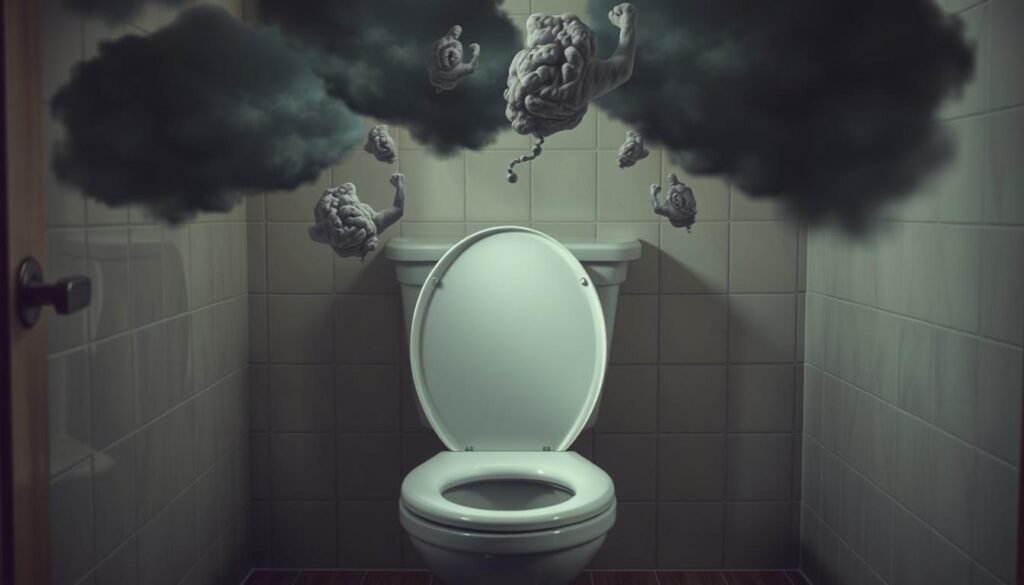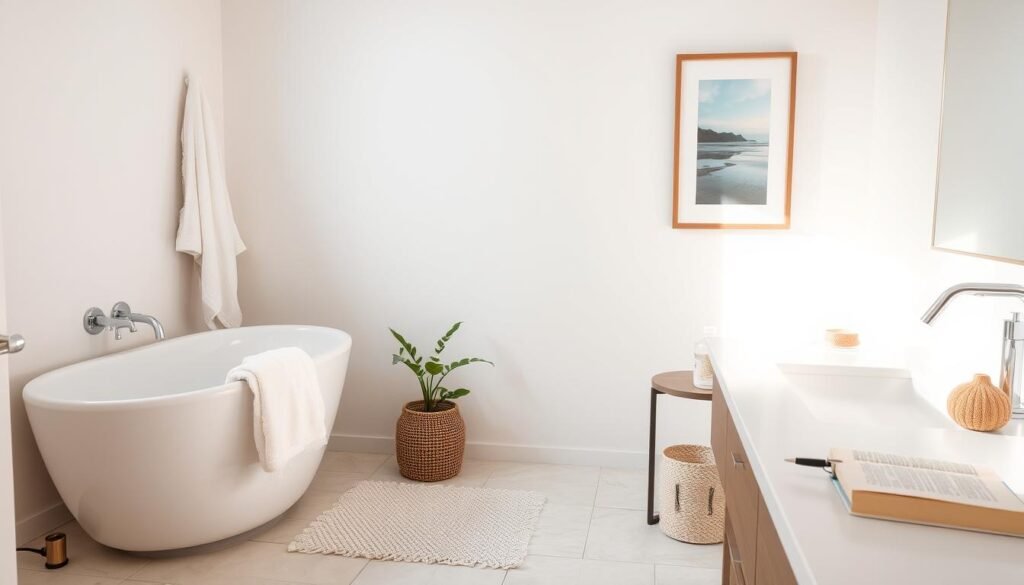Did you know that poop anxiety affects 6.5% to 32% of people? This shows how common the issue is. It can impact mental health and make daily activities challenging. This includes being in social settings or using public restrooms. Understanding what causes toilet anxiety is key. Knowing the triggers and symptoms can help boost confidence when using the bathroom. It also promotes better mental health. Using effective strategies, people can enjoy stress-free bathroom visits and feel mentally relieved.
Key Takeaways
- Poop anxiety affects a significant portion of the population.
- Understanding triggers can lead to effective coping strategies.
- A balanced diet contributes positively to mental relief.
- Mental health and bowel movements are closely linked.
- Professional help can aid in overcoming toilet anxiety.
Understanding Poop Anxiety and Its Impact
Poop anxiety comes from the fear of using public restrooms. It’s related to social anxiety and leads to a lot of stress. People avoid public bathrooms to steer clear of discomfort. This makes them feel shame and adds to their worry.
What is Poop Anxiety?
Poop anxiety means being scared to have bowel movements in public. This fear can make people avoid going out and hurt their life quality. A large number of people even skip social events because of it. Knowing about this can help them find good ways to manage it.
How Common is Poop Anxiety?
A lot of people have poop anxiety. Between 6.5% and 32% of people are affected. One study found that 38.1% avoid traveling because of it. Nearly half didn’t take job offers and many missed out on social activities. Knowing how widespread it is shows the need for help and treatment. For moderate cases, getting professional help can do a lot of good. For more information, check out this resource.
The Gut-Brain Connection: Why Anxiety Affects Bowel Movements
The gut and brain work together, playing a big part in our health. Stress and anxiety can really affect how our bowels work. By understanding this connection, we can better handle anxiety’s effects on our digestion.
The Role of Stress Hormones in Digestion
When we’re stressed, our bodies release hormones like adrenaline and cortisol. These hormones can mess up the digestive system, causing problems. Research shows that stress can make our intestines work too quickly or slowly. This leads to symptoms such as diarrhea or constipation.
Emotions can change our physical health, especially our gut. This is because of the two-way communication between our gut and brain.
Adrenaline and Your Gastrointestinal Tract
Adrenaline gets our body ready for “fight or flight” during stress. This affects our gastrointestinal tract’s function. Stress makes the body focus more on survival, putting digestion on the back burner. This can cause problems with bowel movements, showing how vital stress management is for our digestive health.
To learn more about how this all works, check out the brain-gut connection.
Triggers of Toilet Anxiety in Everyday Life
Toilet anxiety can really affect your day-to-day life. It’s often sparked by different situations that make us feel uncomfortable. Recognizing these triggers is the first step to handling this anxiety. It helps people find ways to feel more at ease, especially when they’re at social events or using public bathrooms.
Public Restrooms: Overcoming the Fear
Using public restrooms can make toilet anxiety worse. The lack of privacy and worries about cleanliness are big concerns. These fears can lead some to avoid using the bathroom altogether. But learning how to deal with these fears can make using public restrooms less stressful.
Using a Friend or Partner’s Bathroom
Even using a bathroom at a friend’s house can cause toilet anxiety. You might worry about what they will think or how clean it is. It’s important to talk about these feelings. This can create a supportive space that lessens the fear of using someone else’s bathroom.
Social Gatherings and Their Effect on Bowel Movements
Large social gatherings can increase toilet anxiety too. The pressure to act a certain way can make people hold in their natural needs. This can be tough and make anxiety worse. Knowing you’re not alone in feeling this way can make dealing with bathroom anxiety easier.
| Trigger | Description | Common Response |
|---|---|---|
| Public Restrooms | Fear of hygiene and lack of privacy. | Bathroom avoidance, intense discomfort. |
| Using a Friend’s Bathroom | Concern over leaving an impression and cleanliness. | Nervousness and reluctance to use the facility. |
| Social Gatherings | Pressure from large groups and fear of judgment. | Holding back urges, resulting in physical discomfort. |
Recognizing Symptoms of Poop Anxiety
Spotting the signs of poop anxiety helps in dealing with this tough situation. It’s key to notice both physical and behavior changes for early help. Let’s dive into these symptoms.
Physical Symptoms Associated with Poop Anxiety
Those with poop anxiety often face physical issues that mess with daily activities. Common signs include:
- Abdominal pain and discomfort
- Muscle tension throughout the body
- Constipation due to avoiding the bathroom
- Stomach turning from stress
- More gas because of eating and digestion issues
Stress can mess with adrenaline and serotonin, making symptoms worse. Since serotonin is mostly in the gut, it impacts these symptoms during stress.
Behavioral Indicators of Toilet Anxiety
Spotting behavior changes can also show signs a person is dealing with toilet anxiety. Here’s what to look for:
- Avoiding places with people
- Staying home to avoid public restrooms
- Worrying a lot about bathroom anxiety
- Changing daily plans for easier bathroom access
It’s vital to notice these behavior changes since they reflect deeper fears. Knowing these signs helps people face their fears better.

Acting against anxiety can improve things a lot. Small steps, like restroom visits before big events and lowering stress, help. Keeping active, eating well, and sleeping enough are good for digestion during stress. Check this resource for more on anxiety and physical health.
Mindfulness Techniques for Relief from Poop Anxiety
Mindfulness techniques help with poop anxiety by focusing on the now. Doing calming activities cuts stress and boosts digestive health. Deep breaths and mindful eating are key for feeling better.
The Power of Deep Breathing
Deep breathing is a core mindfulness technique. It calms your mind and body. Slow breaths help you relax and reduce muscle tightness.
Use deep breathing when you go to the bathroom. Don’t rush. Take it slow, focusing on each breath. Picture yourself calming down with each exhale.
- Inhale slowly through the nose for a count of four.
- Hold the breath for four counts.
- Exhale gently through the mouth for a count of six.
- Repeat this cycle for several minutes to promote relaxation.
Mindful Eating Practices to Calm the Gut
Mindful eating means really enjoying your meals. It’s about not rushing and being aware of your food’s taste and texture. This way, you help your digestion and ease anxiety that affects bowel movements.
Important points for mindful eating include:
- Choose a quiet and comfortable setting for meals.
- Eliminate distractions such as television or phones.
- Listen to your body’s hunger cues and eat slowly.
- Reflect on the nourishing qualities of the food you are consuming.
Toilet Meditation is another way to tackle stress when going to the bathroom. Stay present and relaxed. Understand your body’s signals. This turns a stressful time into a moment of relief.
| Mindfulness Technique | Description | Benefits |
|---|---|---|
| Deep Breathing | Slow, controlled breaths to promote relaxation | Reduces tension, lowers anxiety levels |
| Mindful Eating | Focusing attention on the eating process | Aids digestion, enhances meal appreciation |
| Toilet Meditation | A structured practice to ease bowel movements | Transforms bathroom visits into calming experiences |
Using these techniques makes dealing with poop anxiety easier. It leads to a better relationship with your body and improves your well-being.
Dietary Changes to Support Digestive Health
Changing what you eat can greatly improve your digestive health. It can also reduce the worries related to bowel movements. By choosing healthy foods over bad ones, we see a big difference in our body’s reaction. A balanced diet keeps bowel movements regular and eases symptoms.
Foods to Include for a Healthier Gut
For better digestive health, add these foods to your meals:
- High-fiber foods: Fruits, vegetables, whole grains, and legumes help keep the gut healthy and bowel movements regular.
- Probiotics: Yogurt, kefir, and fermented vegetables boost good bacteria in the gut, enhancing digestion.
- Hydration: Drinking water helps digestion, making stools softer for more regular bowel movements.
This approach can lower the risk of issues like IBS and boost digestive health. For more diet tips, see this guide on diets for digestion.
Foods to Avoid That May Aggravate Symptoms
However, some foods can make digestive problems worse. Try to avoid:
- Caffeine: Present in coffee, tea, and sodas, it can stimulate the gut and increase heartburn symptoms.
- Processed foods: They often contain unhealthy fats and additives, leading to bloating and inflammation.
- Alcohol: Too much alcohol irritates the gut, making symptoms worse.
Avoiding these foods can greatly enhance your digestive health and ease unwanted symptoms.

Therapeutic Approaches to Overcome Poop Anxiety
Various therapeutic methods can help people deal with poop anxiety. Professionals often suggest tailored strategies. Cognitive behavioral therapy and antidepressants are key in this fight.
Cognitive Behavioral Therapy (CBT) and Its Benefits
CBT is a powerful tool against poop anxiety. It works by changing fearful thoughts and behaviors. By addressing negative beliefs about public restrooms, CBT helps develop better coping tactics. Studies show CBT is great for social anxiety about bowel movements, making tough situations easier.
Antidepressants and Their Role in Treatment
Antidepressants, like SSRIs, can lessen anxiety around bowel movements. They work by improving mood and reducing stress. Though not a complete solution, they support treatments like CBT. Always talk to a doctor about using these methods together for a stronger treatment plan.
Practical Tips for Managing Bowel Movement Concerns
Dealing with bowel movement concerns might seem tough. But certain helpful tips can make things much easier. Having a set time for bathroom trips creates a routine. This helps lower stress. Also, making the restroom cozy can help smooth the process.
Establishing a Routine for Bathroom Visits
Having a specific bathroom routine goes along with your body’s clock. Try to go after meals, since that’s when your digestion is busy. This can make dealing with bowel movements easier. Consider doing the following:
- Set a schedule for daily bathroom visits.
- Keep a food and bowel movement diary to track patterns.
- Incorporate high-fiber foods into your diet, targeting 25-35 grams daily.
- Engage in light physical activity to stimulate the digestive system.
Creating a Relaxing Environment for Defecation
Making the bathroom calming can really help. A stress-free space encourages easier bowel movements. Think about trying these ideas:
- Minimize distractions, such as loud noises and harsh lights.
- Utilize aromatherapy or calming scents to promote relaxation.
- Make the restroom comfortable by ensuring proper ventilation and cleanliness.
- Incorporate supportive seating or footstools to encourage a natural position.

| Tip | Description |
|---|---|
| Fiber Intake | Maintain a daily intake of 25-35 grams of fiber for optimal digestion. |
| Routine | Establish regular bathroom timings to align with your body’s needs. |
| Relaxation Techniques | Use calming scents and soft lighting to foster a tranquil restroom experience. |
| Physical Activity | Engage in regular exercise to stimulate intestinal activity and improve bowel function. |
Support Resources for Coping with Defecation Stress
Dealing with stress from defecation can be tough. Many resources are out there to help manage this anxiety. It’s important to seek professional help if you have severe symptoms. Experts can offer personalized advice and solutions. Support networks are also key. They provide emotional support and a feeling of belonging while recovering.
Finding Professional Help
If you’re struggling, talking to healthcare providers can help a lot. They know about gastrointestinal or mental health issues. They can suggest therapies or medications to help with poop anxiety. Plus, they can give tips on dealing with stress from bowel movements. Therapy sessions create a safe place to talk about these issues.
Online Communities and Support Groups
Online groups are great for those dealing with toilet anxiety. They let you share stories and tips in a friendly space. Support groups help you feel less alone. They understand what you’re going through. Joining these groups helps you learn ways to handle your anxiety better.
| Support Resources | Description | Benefits |
|---|---|---|
| Professional Counseling | Therapy sessions focused on anxiety and gastrointestinal health. | Personalized coping strategies, emotional support. |
| Online Support Groups | Virtual gatherings for sharing experiences and strategies. | Connection with others, shared learning, reduced isolation. |
| Workshops | Training on relaxation techniques and anxiety management. | Skill development, social interaction, increased awareness. |
| Dial-in Resources | 24-hour helplines offering immediate support. | Quick access to help in urgent situations. |
Conclusion
Poop anxiety can greatly affect someone’s mental health and life. Many people, especially between 55-74 years old, struggle with it. About 83% are women. Also, 29% might have an anxiety disorder linked to bowel movements.
Mindfulness, diet changes, and therapy can help beat poop anxiety. Techniques like deep breathing help reduce stress. Understanding digestive health through diet is key. Tricyclic antidepressants and relaxation methods have been effective too.
There are ways to relieve bowel concerns. Seeking help and talking about these issues are important steps. This can lead to better digestive health and happiness. Beating poop anxiety is about more than symptoms. It’s about a healthier, happier life.